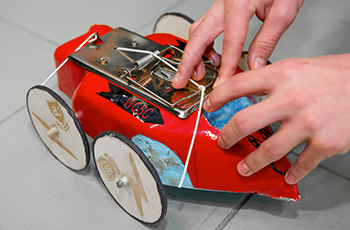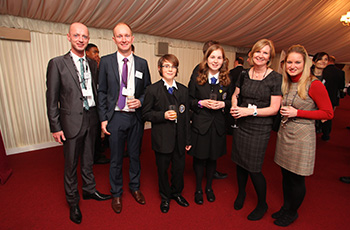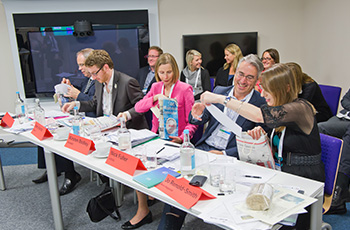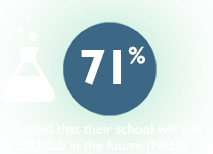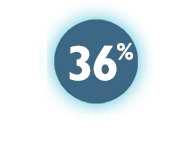STEMNET is extremely proud of the achievements of all of its programmes, as reflected in the NFER evaluation findings.
We have established successful programmes and we are a trusted partner, with tested and proven operating models. Our relationship with educators and business is unique: over 90% of all UK secondary schools (that's nearly 4,000 schools) have accessed our programmes and our 26,000 STEM Ambassadors represent thousands of employers.
It is important that STEMNET learns from the evaluation report to develop and increase the impact that it has on young people, teachers, employers and its volunteer STEM Ambassadors.
We also listen to our partners, schools, business and government and we believe that we can help and support them to meet their objectives for STEM.
"I would say that any opportunity to develop those STEM related skills in young learners which are going to help them to succeed in the world of tomorrow ought to be taken up. This is an opportunity to build confidence, skills, awareness and aspirations of what they can do in the future… I would absolutely recommend STEMNET programmes without a shadow of a doubt."
Head of Department (NFER report)
The Issue:
"Youth unemployment remains stubbornly high, so now more than ever, business, government and the education community must work together to ensure young people learn what they need, for a better job and a better life….This means considering the skills and knowledge that young people need to compete on an international level. We share an ambition to ensure that the qualifications and skills people acquire at school, college, university or in work are truly world class, and globally benchmarked."
Rod Bristow, President of Pearson UK in a CBI press release, June 2013
Stemnet says:
Repeated research highlights issues of school and college leavers, and undergraduates who lack fundamental workplace skills, alongside the appropriate level of STEM knowledge. We know that face-to-face involvement with STEM Ambassadors in schools by students' undertaking practical world-of-work STEM activities has been proven to enhance employability skills. We can see that by working even more closely with employers or employer organisations, we could open up opportunities for industries or sectors to tailor engagement programmes to support STEM employment prospects and future sector skills requirements.
The Issue:
"Both the quality and quantity of talent is dependent on a variety of factors, including educational attainment, timely and impartial careers advice, the take-up of STEM subjects and improving the relationship between local businesses and schools, further education colleges (FEs) and higher education institutions (HEIs). All have a key role to play in nurturing this pipeline and delivering the workforce of tomorrow that is needed to compete with the best the world can offer."
'Skills for Growth A more productive and flexible Labour force' EEF, November 2012
Stemnet says:
STEMNET recognises that many employers would like to engage with schools and colleges, but are often unsure how to start or do not have the in-house capacity to make appropriate connections. By understanding the skills needs of employers, STEMNET can facilitate working with young people to provide opportunities for them to develop in key areas. Collaborative projects that bring industry and education together, whilst giving students practical experience of the world of work, are essential. STEMNET's UK-wide reach means that it is ideally placed to work closely with more employers to develop practical solutions which address the skills shortage.
The Issue:
"By the age of 10 or 11 a significant proportion of pupils have already decided that the idea of studying science after the age of 16 and the idea of a career in a STEM area is ‘not for me'……The ASPIRES project found little understanding among young people and their families of the fact that science and mathematics can open the door to a wide range of occupations and careers – or that STEM fields are predicted to grow in importance. …...The implication is that any attempts to increase rates of participation in STEM need to start early."
‘What influences participation in science and mathematics?' TISME briefing paper 2013
Stemnet says:
STEMNET has a UK-wide network of experts who provide tailored, impartial and free advice to secondary schools covering STEM activities, resources, funding, competitions and events. It's a model which works and is valued by teachers. We feel that STEMNET is well-placed to further enhance its role as a facilitator of STEM education activities. We recently undertook a very successful pilot scheme to provide STEM Ambassadors to Higher Education Institutes to determine how the students benefited from learning about real life careers and roles in STEM and the world of work. Whilst we aren't funded to proactively work with primary schools, our STEM Ambassadors do try and meet requests for this age group and we would like to be able to develop STEMNET as an established and accepted route for primary schools to engage with STEM careers. We believe that it is never too early or too late for young people to meet inspirational role models and we are constantly looking for ways that we can bring value and benefit to young people, regardless of age, background or previous educational attainment.
The Issue:
"It is vitally important that young people have access to information on the full range of career pathways available so they can make informed choices about their next steps. Our findings show that too few schools are doing enough to ensure all their students receive comprehensive advice about the breadth of career opportunities available to them. 'It is worrying that the new arrangements are failing to provide good guidance or to promote vocational training options and apprenticeships. Given the high levels of youth unemployment, even amongst graduates, it is important the Government, schools, local authorities and other agencies all work to improve the quality of careers advice in schools."
Her Majesty's Chief Inspector, Sir Michael Wilshaw, September 2013
Stemnet says:
Schools have to deliver a range of programmes and meet targets including the new statutory duty on schools to provide careers. STEMNET knows that many teachers have little or no first-hand knowledge of STEM business to impart to their students. The evaluation report clearly shows that 86% of teachers report an increased awareness of STEM career and employment options thanks to a STEM Ambassador or STEM Club. We'd like to see this figure go even higher and STEMNET can help to bridge the gap, by looking at new ways of working such as developing a support programme for teachers and helping them to connect with STEM employers. STEMNET could also deploy a specific STEM Ambassador cohort of apprentices and technicians to support non-degree access to STEM careers.
The Issue:
"A key factor influencing children's aspirations is what we have called the availability of ‘science capital' among pupils and their families. Science capital refers to science-related qualifications, interest, understanding (‘scientific literacy') and social contacts (for example knowing people who work in STEM- related jobs). Our evidence shows that the more science capital a family has, the more likely a child is to express interest in science as a career and/or aspire to wish to study science further."
‘What influences participation in science and mathematics?' TISME briefing paper 2013
Stemnet says:
STEM Clubs have been proven to be phenomenally successful in schools and we feel that there is huge scope to offer all young people the STEM Club concept, even outside of traditional education establishments. We believe that all young people can benefit from informal STEM learning and we would be keen to talk to other organisations such as youth clubs, community groups or established networks such as the Girl Guides, to see if this could be delivered. An expanded STEM Clubs programme could be accompanied by the design of bespoke resources specifically for use within the Club environment, working with partners in business to develop STEM Challenges, to provide competitive activities which stimulating and fascinating STEM activities for young people and meet business or corporate objectives.


 Michael Davis, Chief Executive, UK Commission for Employment and Skills
Michael Davis, Chief Executive, UK Commission for Employment and Skills
